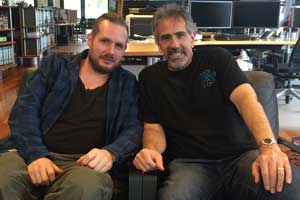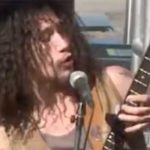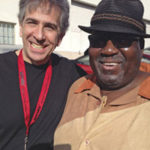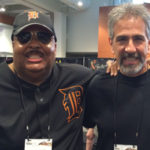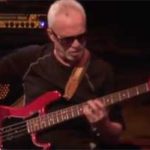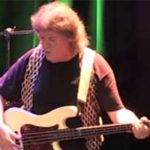Meshuggah bass player describes the early days, bass technique, jazz influences and more
Exclusive FBPO interview with FBPO’s Jon Liebman
March 2, 2016
A native of Varberg, Sweden, Dick Lövgren is best known as bassist for Swedish metal band Meshuggah. FBPO’s Jon Liebman sat down with Dick at the 2015 Warwick Bass Camp in Markneukirchen, Germany.
FBPO: How would you describe your musical upbringing? Do you come from a musical family?
DL: It was in school, basically. I’m not from a very musical family, but there were music classes in school, so that was where it happened. We had access to rehearsal spaces and getting bands together and performing and all that.
FBPO: Were you playing bass right from the beginning?
DL: Yes.
FBPO: Upright bass?
DL: Electric bass.
FBPO: I would think that at that age, in that kind of environment, it would be upright.
DL: I don’t play upright at all!
FBPO: Out of all the instruments, why did you choose the bass?
DL: There was some kind of attraction to the sound, especially in certain kinds of music. When I heard Cliff Burton’s bass solos, for instance. Stuff like that. That’s what created the attraction, I think.
FBPO: Other than Cliff Burton, who were some of your other bass influences once you discovered the instrument?
DL: John Patitucci was pretty early as well. It was really nice getting to meet him two years ago at the Warwick Bass Camp, so that was pretty cool. Anders Jormin is one of my favorites as well, a Swedish upright player.
FBPO: How did you take your experience as a young boy learning music in school and become a professional musician?
DL: Just opportunities that came along the way. I just loved playing, practicing. That’s all I did, more or less. Then opportunities came and I started jamming with people and that’s what happened.
FBPO: I was surprised to learn that a lot of your influences were in the jazz world. In reading your bio, I saw Mile Davis’ name and Dave Holland’s name.
DL: I think that’s where I could hear innovative art. That’s where a lot of new music happened for me when I listened to it. Jazz, for me, is a platform where a lot of stuff is allowed.
FBPO: [Laughs] How did you come to be part of Meshuggah? What was the story there?
DL: Friends in common and they needed a bass player.
FBPO: The band was already formed and you joined later, right?
DL: Yeah, that’s right. I joined in 2003. They’ve been around since ’89 or something like that. I went to the studio and we jammed a little bit and I got the gig.
FBPO: Some of Meshuggah’s music is extremely intricate and complicated – and fast! How would you describe the bass technique required to do the stuff in Meshuggah’s songs?
DL: There are only a couple songs that are technically demanding, I think. And for that it’s just in the creation, back when we first started playing together. For instance, the song “Bleed.” It’s not very fast except it might sound worse than it is. [Laughs]
FBPO: What can you share with us about the songwriting process and the recording process in the band Meshuggah?
DL: We are writing at the moment, actually. Tomas (Haake), the drummer, and I are writing together for the next album. There’s more than one way to do it. One of the procedures starts with Tomas playing a drumbeat that feels good for him. When I write, I like to create music for each individual instead of (just) my ideal. I want to make it comfortable and make other musicians be able to express themselves. Sometimes Tomas will come up with that first idea, a vibe, like a rhythm. From that I create a tonality and riffs from my vocabulary and we go from there and see what happens.
FBPO: Tell me about your equipment. I know you’ve been playing a Warwick bass for a long time.
DL: Again, it was like an early attraction. The quality has been so even and sweet through all the years and all the touring. They were always there for me, so I stuck with them.
FBPO: What about the future?
DL: I’ve been touring with Meshuggah since 2012, but I also do a lot with my jazz band, Angry Loner, which is very, very fun for me. And we’re writing.
FBPO: What would you be if you weren’t a bass player?
DL: I have no clue!
